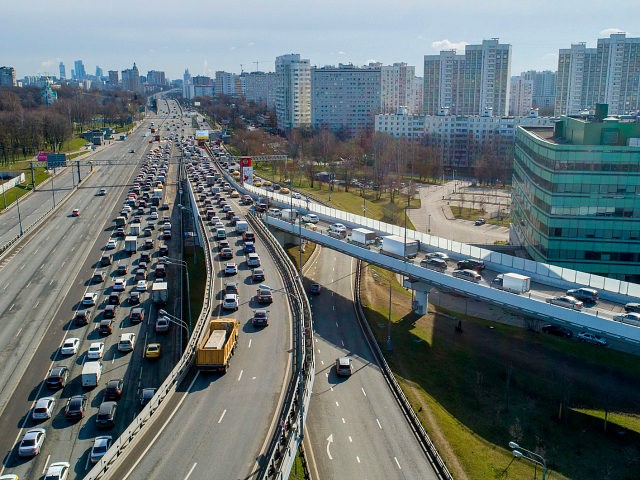Measures taken in Moscow, Russia, to control residents’ travel amid the Chinese coronavirus pandemic sparked city-wide chaos on Wednesday, prompting concern that the virus may now spread even further.
On Wednesday, authorities introduced a tracking system aimed at monitoring and enforcing residents’ movements around the city during the ongoing lockdown. Digital passes are necessary for all personal and public transport, with heavy fines imposed on those violating the policy. At least 900,000 people have already had their applications rejected for providing inaccurate or false information.
Images posted on social media showed large, tightly condensed crowds formed across the city’s metro stations during morning rush hour as people waited for authorities to check their passes. Traffic data also showed heavy congestion at nearly all entryways to the city as traffic police checked vehicles for passes one by one.
According to state media, the delays were mainly caused by a shortage of police officers available to carry out the checks and some tailbacks stretched as long as five kilometers. Mayor Sergei Sobyanin has since confirmed that officials are planning to automate the process of checking passes.
In response to the chaos, Kremlin spokesperson Dmitry Peskov sought to remind Muscovites that the healthcare system in the city is under immense pressure.
“Muscovites and guests of the capital … have not shown proper discipline in observing the regime of self-isolation,” he said.
Rachel Denber, deputy Europe and Central Asia director at Human Rights Watch, told the Moscow Times that many people in Moscow are still going to their jobs as they perform essential work.
“Yes, the authorities need to enforce social distancing. It needs to do so in a way that’s proportionate,” she explained. “But the new QR code system, combined with this kind of enforcement, is handing these people, who are already putting themselves on the line, unnecessary, potentially hazardous, burden.”
Moscow, with its population of nearly 12 million, remains the epicenter of Russia’s coronavirus pandemic, with around 20,000 of Russia’s nearly 25,000 cases coming from the capital. However, there is now concern that the virus may soon descend on St Petersburg, which has so far recorded under 1,000 cases. The city’s hospitals are therefore preparing for a surge of cases by increasing bed capacity and stocking up on inventories.
Follow Ben Kew on Facebook, Twitter at @ben_kew, or email him at bkew@breitbart.com.

COMMENTS
Please let us know if you're having issues with commenting.